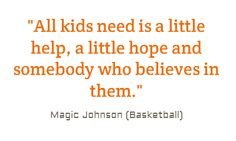For thousands of years, sport has been a crucial part of most good education systems, for good reason. Whether sport is played as an individual or as a team, it has important lessons to teach us which carry over into the rest of life, and which apply to business, politics, teamwork and leadership.
Sport teaches us tenacity, focus, perseverance, patience, strength, concentration, timing, courage, adaptability and skill. Sport teaches both mental and physical agility. Sport teaches us to time our run and to tolerate and overcome physical pain and limitations. Sport is about thinking and strategising, and its about mental toughness and resilience. Ultimately, sport is more about the mental challenge than the physical one.
Sport teaches us sportsmanship, which is essentially how to handle ourselves with grace, dignity and humility in victory and defeat. And whether we are participants or spectators, to be good sports there can be no complaint, tantrums, weakness or bad grace, and the only tears we are allowed to shed are tears of joy.
Let’s take a look at them on an individual basis:
Social skills
- The social aspect of sports might be what entices children to play in the first place. Youth sports participation enables children to spend time with friends in a safe environment and obtain social skills that are likely to last a lifetime. Aside from bonding with peers, youth learn to solve conflicts effectively, reach common goals and learn to be more assertive, all while getting physical fitness. A child’s communication skills also are enhanced after playing a sport, giving a child needed life skills.
Competitive skills
- Although there is such a thing as being too competitive, it’s important for a child to understand the positive aspects of competition. Adults are surrounded by competition, from getting a job to moving up in the work force, and when children learn the basics of competition early, they have a better chance of succeeding. Sports participation helps children cope with competition in a friendly environment. Working to achieve a goal or being part of a team will help youth gain healthy competitive skills that they can use for the rest of their lives.
Sportsmanship
- Sportsmanlike behavior is a lesson that children obtain from playing sports. Children learn to positively handle both the winning and losing aspect of playing a sport, and good sportsmanship is a trait that carries over from childhood to adulthood. Athletes who focus on mastering personal improvement have a good chance on later becoming good citizens and hard workers. Good sports tend to better cooperate with others and make moral decisions instead of being ego-oriented individuals who behave badly.
Leadership abilities
- Achieving leadership skills is a life lesson learned when children participate in sports. Obtaining leadership qualities that range from being a good character, to respecting others, to being task oriented can be accomplished in both team and individual sports. A solid support system, such as a strong parental.
Building Character
Michael Jordan once said, “I’ve failed over and over again in my life. And that is why I succeed.” Not allowing your child to give up when he is afraid of failing or being rejected by friends, or is tired of working hard, builds character that can propel him or her into life as a successful, productive adult.
In work and the rest of life, sport reminds us to do better, last longer, be stronger and aim higher. And strive, individually and in teams.

